On Wednesday, November 9, NDN Collective joined Indigenous advocates and allies outside of the Supreme Court as oral arguments in the federal lawsuit, Brackeen v. Haaland (2021) began. Known as the “Brackeen case,” Brackeen v. Haaland is challenging the constitutionality of the Indian Child Welfare Act (ICWA), an act passed in 1978 to ensure that Native American children are kept with Native families.
The plaintiffs in the case are three white adoptive couples and the State of Texas, and together, they claim that ICWA has caused them harm in their pursuit to adopt Native American children, while discriminating against them based on race. Should the decision of this case turn in favor of the plaintiffs, the impact on Tribal sovereignty could be devastating.
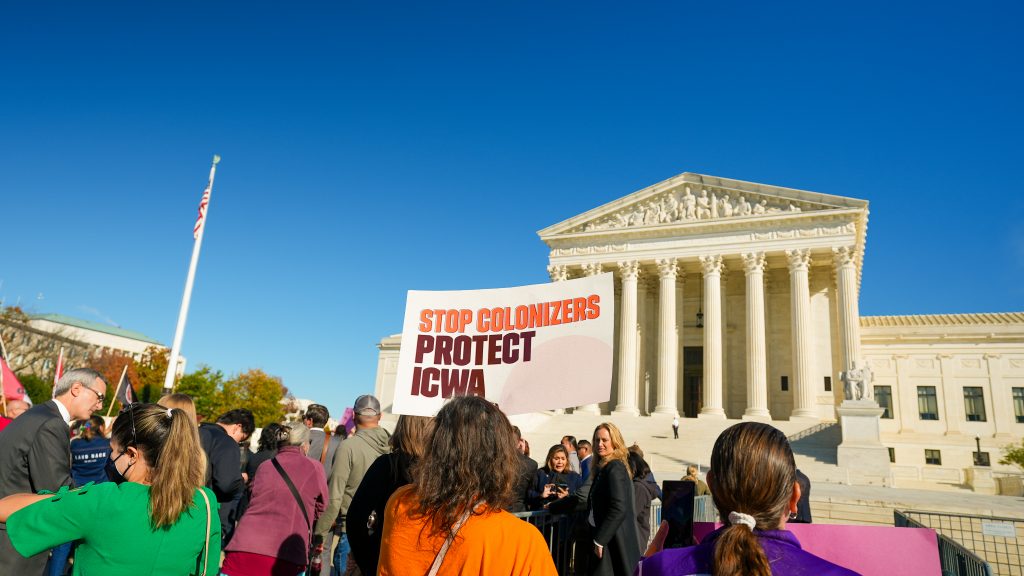
The outcry of support for ICWA, Tribal sovereignty, and the intervening Tribes involved in this case brought relatives together from across Turtle Island. Before the hearing began on Wednesday, hundreds gathered together in prayer, song, and medicine for the conversation taking place inside the doors of the Supreme Court.
As oral arguments began, participants waited outside of the Supreme Court joined by members from the National Indian Child Welfare Association (NICWA), who created a space outside of the venue for sign-making and to hear from members and attorneys from the Native American Rights Fund (NARF) and the National Congress of American Indians (NCAI).
The feeling of uncertainty was palpable as participants waited for oral arguments to conclude. Still remaining hopeful, many held up signs and smudged with sweetgrass while waiting for word to come.
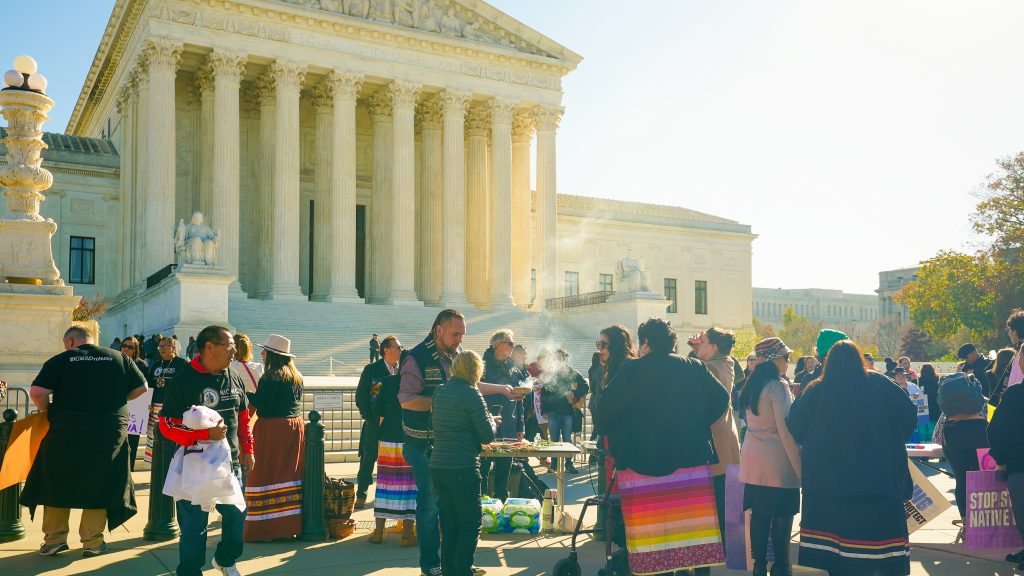
Oral arguments in Brackeen v. Haaland (2021) streamed live on the Supreme court website and would last three and a half hours. In that time, the Supreme Court justices and attorneys would discuss more than just the Indian Child Welfare Act; they would also examine foundational statutes relating to the Indian-federal trust relationship, historical cases speaking to the application of sovereign rights, and provisions of ICWA.
At the conclusion of the hearing, NDN Collective covered the event live on the ground, capturing the moment that oral arguments ended. Among those interviewed by the NDN Collective team was Rebecca Nagle, Cherokee journalist, host, producer, and writer of the This Land Podcast. Rebecca was previously featured on another NDN Live episode discussing her podcast and the evolution of Brackeen v. Haaland (2021). Picking up from that conversation, Nagle provided insight into key takeaways from the hearing itself.
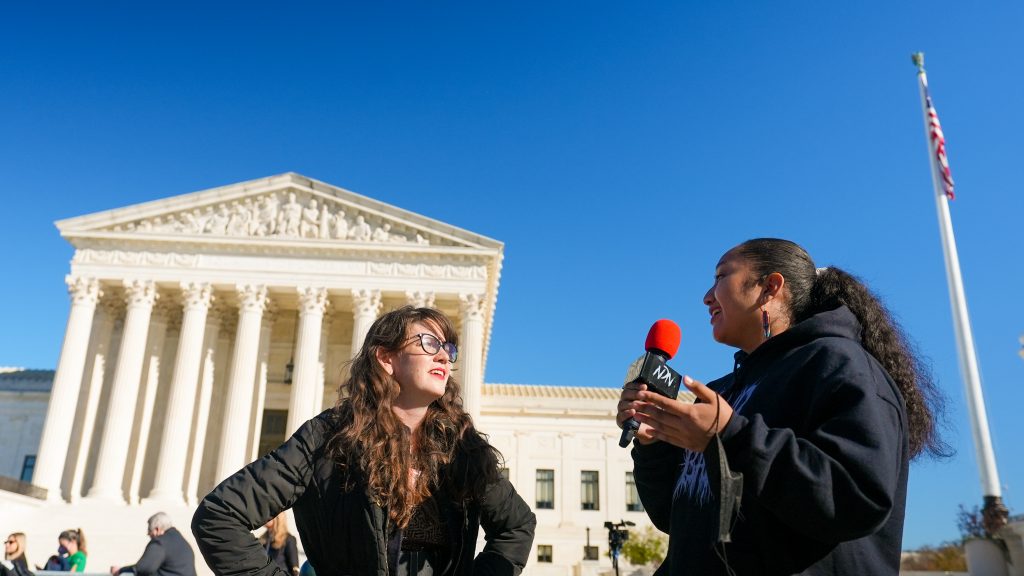
“There were Justices that were very clearly skeptical of Texas and the Individual plaintiffs’ arguments about Federal Indian Law,” said Nagle on the livestream. “So you saw Matthew McGill, the attorney for the individual plaintiffs, face some pretty hard questioning, but I think the big question is how many of the Justices are skeptical. So you definitely saw skepticism from four of the Justices.”
“There was also a lot of moments where the Justices displayed a real lack of understanding of how ICWA actually works and how the law actually functions,” Nagle continued “So there was more discussion in the courtroom about hypotheticals and ‘what about this situation,’ versus actually talking about how the law applies on the ground.”
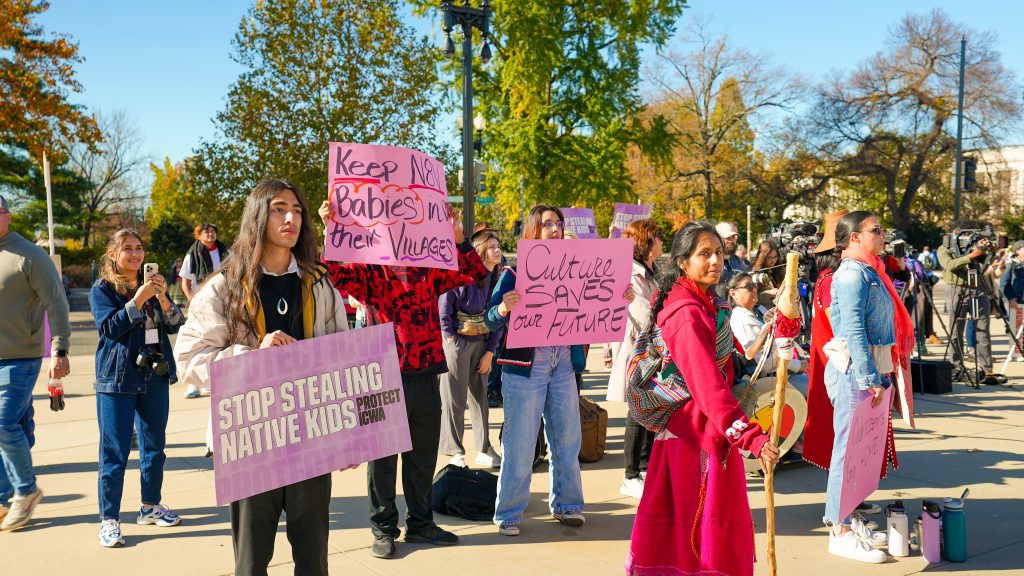
Intervening Tribal parties in Brackeen v. Haaland (2021) would take to a podium outside of the Supreme Court to share sentiments about what had occurred during the hearing, as well as to share key takeaways. Guest speakers included Tehassi Hill, Chairman of the Oneida Nation; Robert Martin, Tribal Chairman of the Morongo Band of Mission Indians; and Fawn Sharp, member of the Quinault Nation and President of the National Congress of American Indians.
“The biggest takeaway for us is I think we are all realizing we’re at a sacred moment in time, and I’ve called it a sacred moment because we are that seventh generation and our ancestors long foretold a day of reckoning when this world wasn’t going to be sustainable,” said Fawn Sharp in the livestream interview with NDN Collective. “It is the Native people that are bringing people together with our common values that are undeniable, that we should be treated equally, and live as our creator intended.”
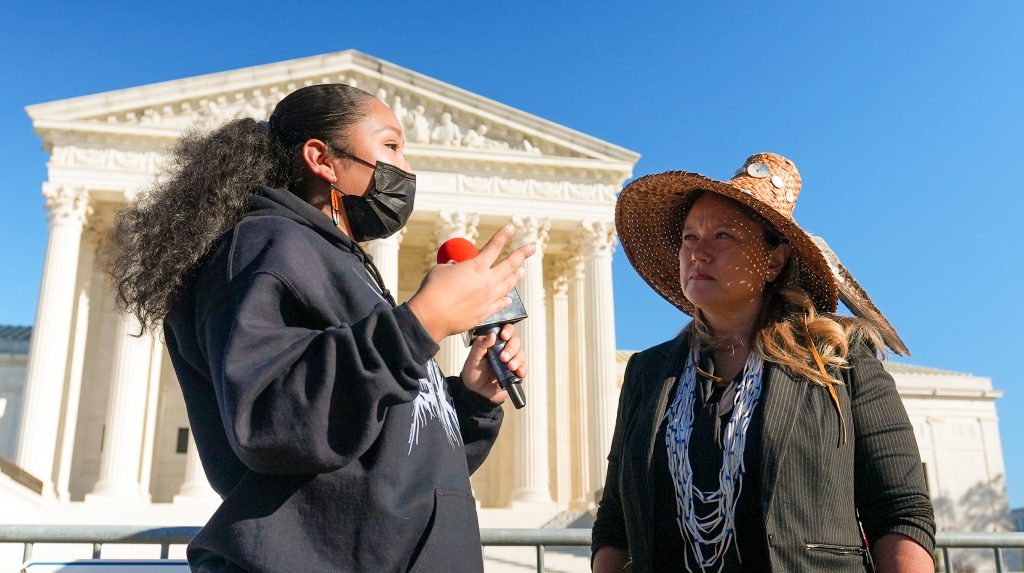
“I just know we are on the right side and that’s going to continue to solidify us because I think each and every one of us feel this and we want to find ways to come together,” said Sharp. “And we are coming together and we are going to continue to make advancements.”
The reflections after the hearing shared by Tribal leaders captured the determined energy that was present outside of the Supreme Court on Wednesday morning. Indigenous Peoples from many Nations gathered together in solidarity, directly confronting the threat being posed to the protection of Indigenous children. Should Justices of the Supreme Court decide to rule against the statutory arguments being made against the Indian Child Welfare Act (ICWA), it could be catastrophic to federal statutes that impact Indigenous communities, including Indian gaming, healthcare, land, and water rights. As this case continues, Tribal communities and allies will unquestionably continue to stand in defense of the inherent rights held as the first peoples of this nation.
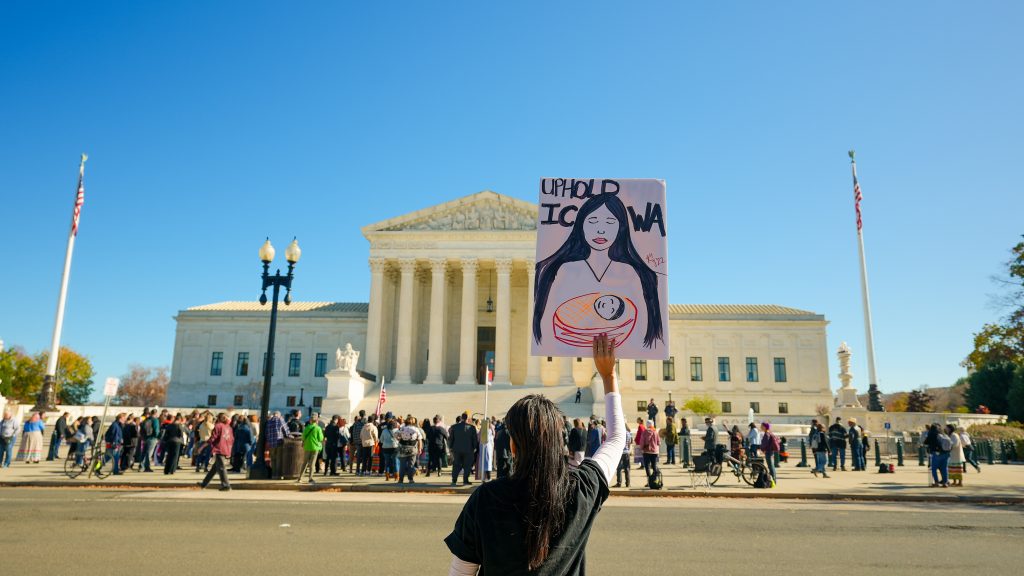
The Supreme Court adjourned this session of oral arguments with another hearing scheduled to continue this coming Monday, November 14. Oral Arguments will continue with a final decision to be determined in June 2023. NDN Collective will continue to follow this case as it progresses.
Watch the Full NDN Live with Coverage of the Brackeen v. Haaland Hearing in Washington, D.C. Here
Related Stories and Media:
NDN Live | The Indian Child Welfare Act is Under Attack #ICWA
Atlantic | By Rebecca Nagle | The Supreme Court Case That Could Break Native American Sovereignty
The Nation | By Rebecca Nagle | The Story of Baby O – and the Case That Could Gut Native Sovereignty
Indian Country Today | Indigenous People Flock to DC for ICWA Hearing

